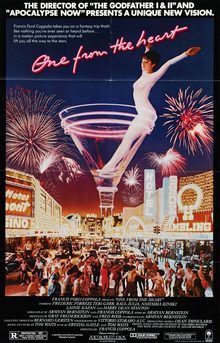
Francis Ford Coppola is an American film director, producer, and screenwriter. He is considered one of the leading figures of the New Hollywood film movement and is widely considered one of the greatest directors of all time. Coppola is the recipient of five Academy Awards, six Golden Globe Awards, two Palmes d'Or, and a BAFTA Award.
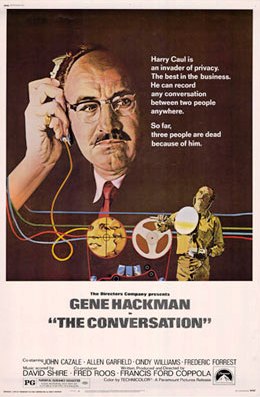
The Conversation is a 1974 American neo-noir mystery thriller film written, produced, and directed by Francis Ford Coppola and starring Gene Hackman, John Cazale, Allen Garfield, Cindy Williams, Frederic Forrest, Harrison Ford, Teri Garr, and Robert Duvall. Hackman portrays a surveillance expert who faces a moral dilemma when his recordings reveal a potential murder.
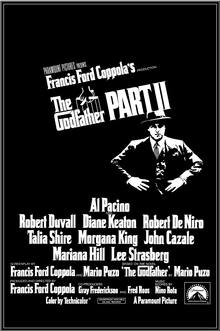
The Godfather Part II is a 1974 American epic crime film. The film is produced and directed by Francis Ford Coppola, loosely based on the 1969 novel The Godfather by Mario Puzo, who co-wrote the screenplay with Coppola. It is both a sequel and a prequel to the 1972 film The Godfather, presenting parallel dramas: one picks up the 1958 story of Michael Corleone, the new Don of the Corleone family, protecting the family business in the aftermath of an attempt on his life; the prequel covers the journey of his father, Vito Corleone, from his Sicilian childhood to the founding of his family enterprise in New York City. The ensemble cast also features Robert Duvall, Diane Keaton, Talia Shire, Morgana King, John Cazale, Marianna Hill, and Lee Strasberg.

The Godfather Part III is a 1990 American epic crime film produced and directed by Francis Ford Coppola from the screenplay co-written with Mario Puzo. The film stars Al Pacino, Diane Keaton, Talia Shire, Andy García, Eli Wallach, Joe Mantegna, Bridget Fonda, George Hamilton, and Sofia Coppola. It is the third and final installment in The Godfather trilogy. A sequel to The Godfather (1972) and The Godfather Part II (1974), it concludes the fictional story of Michael Corleone, the patriarch of the Corleone family who attempts to legitimize his criminal empire. The film also includes fictionalized accounts of two real-life events: the 1978 death of Pope John Paul I and the Papal banking scandal of 1981–1982, both linked to Michael Corleone's business affairs.

The Cotton Club is a 1984 American musical crime drama film co-written and directed by Francis Ford Coppola and based on James Haskins' 1977 book of the same name. The story centers on the Cotton Club, a Harlem jazz club in the 1930s. The film stars Richard Gere, Gregory Hines, Diane Lane, and Lonette McKee, with Bob Hoskins, James Remar, Nicolas Cage, Allen Garfield, Gwen Verdon, Fred Gwynne and Laurence Fishburne in supporting roles.

James Edmund Caan was an American actor. He came to prominence playing Sonny Corleone in The Godfather (1972) – a performance that earned him Academy Award and Golden Globe nominations for Best Supporting Actor. He reprised his role in The Godfather Part II (1974). He received a motion-picture star on the Hollywood Walk of Fame in 1978.

American Zoetrope is a privately run American film production company, centered in San Francisco, California and founded by Francis Ford Coppola and George Lucas.

Hearts of Darkness: A Filmmaker's Apocalypse is a 1991 American documentary film about the production of Apocalypse Now, a 1979 Vietnam War epic directed by Francis Ford Coppola.
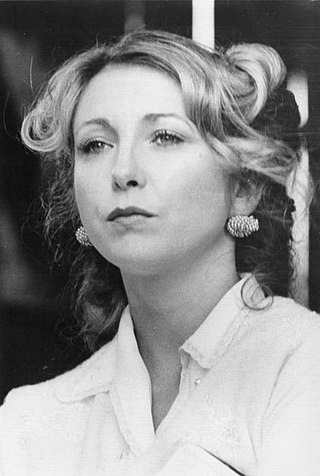
Teri Ann Garr is an American retired actress. She has frequently appeared in comedic roles throughout her career, which spans four decades and includes over 140 credits in film and television. Her accolades include an Academy Award nomination, a BAFTA Award nomination, and a National Board of Review Award.

Vittorio Storaro, A.S.C., A.I.C., is an Italian cinematographer widely recognized as one of the best and most influential in cinema history, for his work on numerous classic films including The Conformist (1970), Apocalypse Now (1979), and The Last Emperor (1987). In the course of over fifty years, he has collaborated with directors such as Bernardo Bertolucci, Francis Ford Coppola, Warren Beatty, Woody Allen and Carlos Saura.
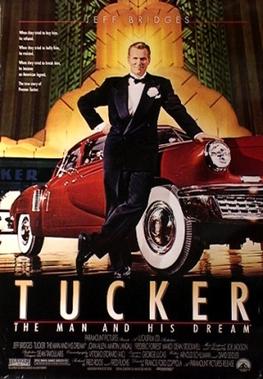
Tucker: The Man and His Dream is a 1988 American biographical comedy-drama film directed by Francis Ford Coppola, starring Jeff Bridges as inventor Preston Tucker. The film recounts Tucker's story and his attempt to produce and market the Tucker 48, which was met with scandal between the Big Three automobile manufacturers and accusations of stock fraud from the U.S. Securities and Exchange Commission. Joan Allen, Martin Landau, Elias Koteas, Frederic Forrest and Christian Slater appear in supporting roles. For his performance, Landau was nominated for the Academy Award and won the Golden Globe Award for Best Supporting Actor.

Apocalypse Now Redux is a 2001 American extended version of Francis Ford Coppola's epic 1979 war film Apocalypse Now. Coppola, along with editor and longtime collaborator Walter Murch, added 49 minutes of material that had been removed from the initial theatrical release. It is a significant re-edit of the original version.
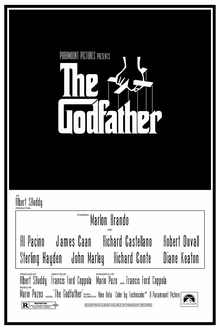
The Godfather is a 1972 American epic gangster film directed by Francis Ford Coppola, who co-wrote the screenplay with Mario Puzo, based on Puzo's best-selling 1969 novel. The film stars an ensemble cast including Marlon Brando, Al Pacino, James Caan, Richard Castellano, Robert Duvall, Sterling Hayden, John Marley, Richard Conte and Diane Keaton. It is the first installment in The Godfather trilogy, chronicling the Corleone family under patriarch Vito Corleone (Brando) from 1945 to 1955. It focuses on the transformation of his youngest son, Michael Corleone (Pacino), from reluctant family outsider to ruthless mafia boss.

Mountains of the Moon is a 1990 American biographical film depicting the 1857–1858 journey of Richard Francis Burton and John Hanning Speke in their expedition to Central Africa, which culminated in Speke's discovery of the source of the Nile River and led to a bitter rivalry between the two men. The film stars Patrick Bergin as Burton and Iain Glen as Speke. Delroy Lindo appears as an African whom the explorers meet.
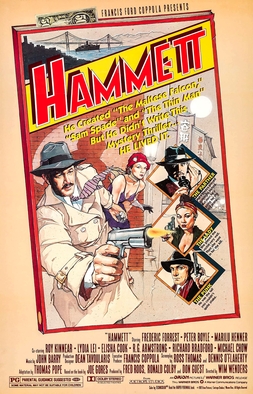
Hammett is a 1982 American neo-noir mystery film directed by Wim Wenders and executive produced by Francis Ford Coppola. The screenplay was written by Ross Thomas and Dennis O'Flaherty, based on the novel of the same name by Joe Gores. It stars Frederic Forrest as detective story writer Dashiell Hammett, who gets caught up in a mystery very much like one of his own stories. Marilu Henner plays Hammett's neighbor, Kit Conger, and Peter Boyle plays Jimmy Ryan, an old friend from Hammett's days as a Pinkerton agent. The film was entered into the 1982 Cannes Film Festival.
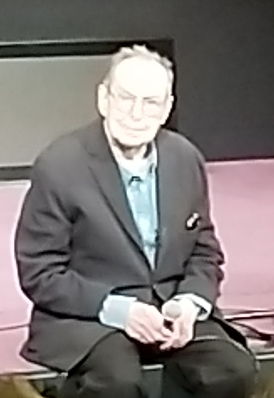
Dean Tavoularis is an American motion picture production designer whose work appeared in numerous box office hits such as The Godfather films, Apocalypse Now, The Brink's Job, One from the Heart, and Bonnie and Clyde.

The Black Stallion Returns is a 1983 adventure film, an adaptation of the book of the same name by Walter Farley, and sequel to The Black Stallion. The only film directed by Robert Dalva, it was produced by Francis Ford Coppola for MGM/UA Entertainment Company.
The Godfather is a trilogy of American crime films directed by Francis Ford Coppola inspired by the 1969 novel of the same name by Italian American author Mario Puzo. The films follow the trials of the fictional Italian American mafia Corleone family whose patriarch, Vito Corleone, rises to be a major figure in American organized crime. His youngest son, Michael Corleone, becomes his successor. The films were distributed by Paramount Pictures and released in 1972, 1974, and 1990. The series achieved success at the box office, with the films earning between $430 and $517 million worldwide. The Godfather and The Godfather Part II are both seen by many as two of the greatest films of all time. The series is heavily awarded, winning 9 out of 28 total Academy Award nominations.
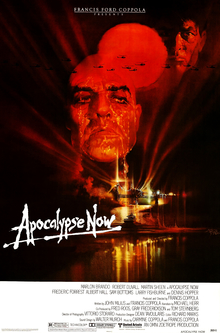
Apocalypse Now is a 1979 American epic war film produced and directed by Francis Ford Coppola. The screenplay, co-written by Coppola, John Milius, and Michael Herr, is loosely inspired by the 1899 novella Heart of Darkness by Joseph Conrad, with the setting changed from late 19th-century Congo to the Vietnam War. The film follows a river journey from South Vietnam into Cambodia undertaken by Captain Willard, who is on a secret mission to assassinate Colonel Kurtz, a renegade Special Forces officer who is accused of murder and presumed insane. The ensemble cast also features Robert Duvall, Frederic Forrest, Albert Hall, Sam Bottoms, Laurence Fishburne, Dennis Hopper, and Harrison Ford.

The following is a list of unproduced Francis Ford Coppola projects in roughly chronological order. During his long career, American film director Francis Ford Coppola has worked on a number of projects which never progressed beyond the pre-production stage under his direction. Some of these productions fell in development hell or were cancelled.
